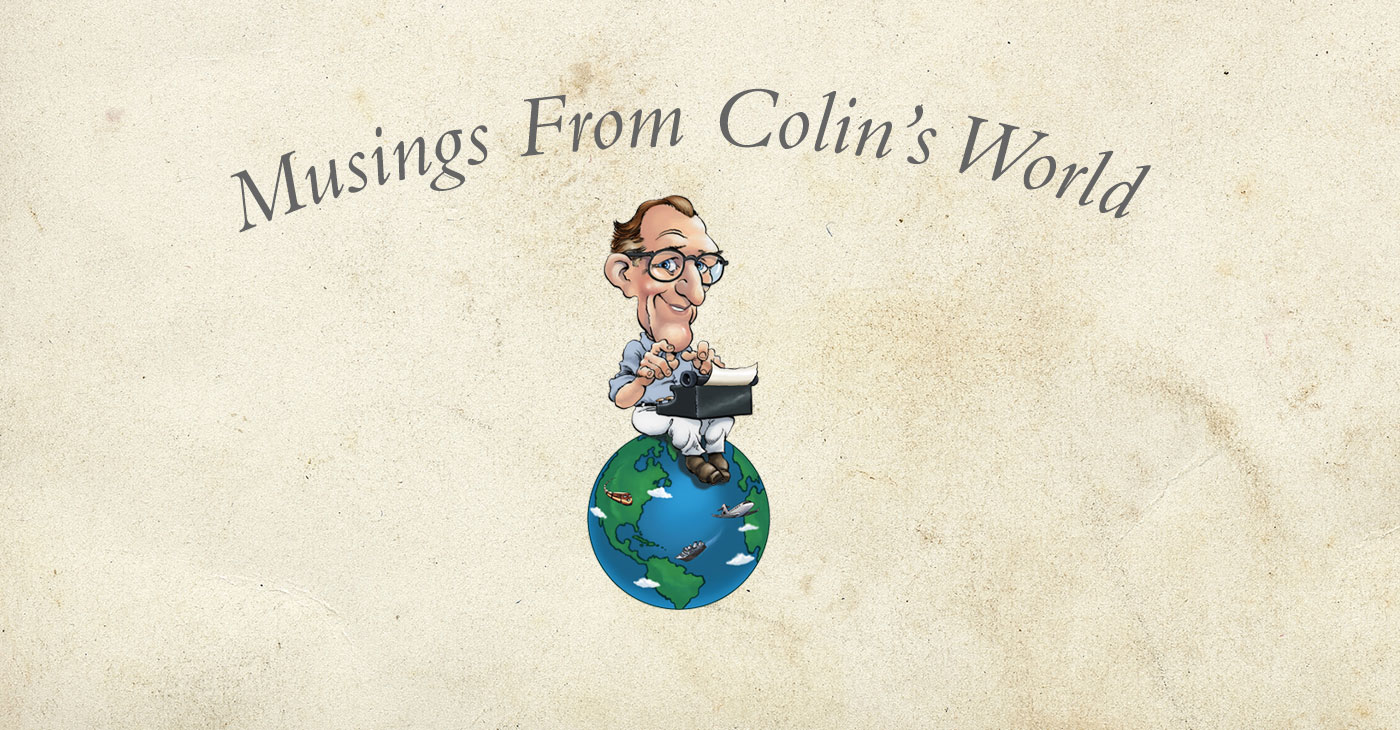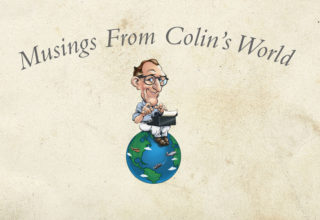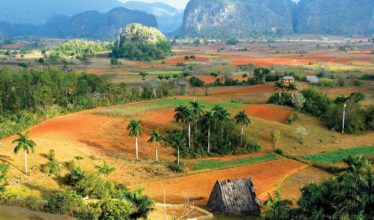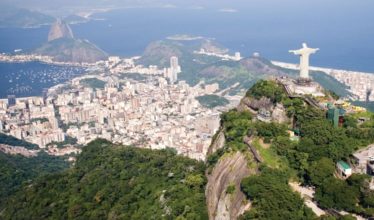The trogon, the national bird of Cuba, is colored bright red, blue and white, almost as if it were draped in the Cuban flag. It is said that the trogon cannot be held in captivity, that it will die if confined to a cage.
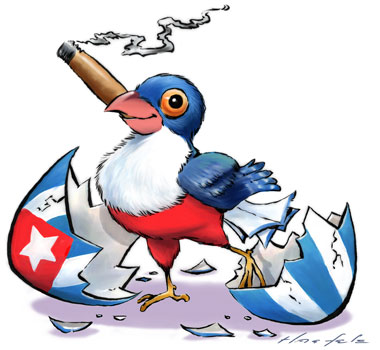
One of the most wonderful things about travel is that no place is ever quite what you expect when you encounter it for the first time. Our preconceptions are composites of impressions compiled over years, forming a mental model. But that model is only a mental construct and will shatter the moment we encounter the real thing. And what a glorious shattering that is! How liberating and exciting! It’s like a baby chick cracking its eggshell and encountering the world for the first time.
Our impressions come to us through various media and prisms, and none of those prisms is more distorting than politics. The more heated the political debates about a place, the more the messages we receive about it are colored by politics. There are few, if any, places where the images we receive are more distorted by politics than Cuba. For more than half a century, the American government has seen Cuba as an enemy nation. Even today a strict economic embargo on Cuba is still in place and emotions about Cuba still run hot. That is part of what makes visiting Cuba so exciting. It so thoroughly defies one’s preconceptions.
In recent years more and more Americans have been able to visit Cuba to see for themselves a neighboring country that has been hidden behind an Iron Curtain from the early days of the Cold War for most of the lifetimes of people living today.
Cuba is on the cusp of big changes. The country has been opening up to international markets and liberalizing its laws so that more Cubans can go into business for themselves. Inns and restaurants are opening that are owned and operated by private citizens, which is electrifying the Cuban landscape and opening many new possibilities.
Anyone who has seen how Cubans have kept their 1950s American cars running for decades has seen the great resourcefulness of the Cuban people. As more avenues open for them to channel their creative energy, the ongoing display will be exciting for a long time to come.
While dramatic change is ongoing in Cuba, there are certain moments when the change is even more dramatic than usual, and such a unique moment in Cuba recently took place with the recent passing of Fidel Castro. He had been the country’s leader from 1959 until 2006, when he ceded power to his brother and fellow revolutionary Raul Castro.
Fidel Castro, who survived 10 presidents while he was in office, finally passed away on November 25, 2016. It was a unique moment in history, and there were some Americans who were visiting Cuba during the week of mourning and had the opportunity to observe the country at that historic moment.
I was fortunate to be able to talk to a friend who had been there about her experience during Cuba’s nine-day period of mourning. It was one of those moments when travel provides a unique glimpse into the workings of the world. It was a watershed moment, though it will be some time before historians can understand exactly what changes we are observing today.
My friend Liz and a small group of friends had planned to travel to Cuba together and then a few days before they were ready to go, they heard the news that Castro had died.
They were booked to arrive in Havana on Wednesday and then on the Saturday before, her alarm woke her to the news saying, “Fidel’s ashes will be …” She was startled out of sleep.
“I thought, ‘Oh my goodness, this is going to be a unique time to go to Cuba!’”
Because it was such a unique moment, it was clear that tours in Cuba could not operate normally and travelers would not experience “business as usual.” The travelers had to decide whether or not to go ahead with their plans and visit Cuba when the nation was in a state of mourning and much of the normal activity of the country would not be taking place.
But Liz and her friends discussed it and decided that they wanted to go. It would be an amazing glimpse of Cuba at a unique historical moment. And the likelihood of them all being able to coordinate their schedules to travel together again was not good.
They flew into Havana on Wednesday morning two days after there had been giant gatherings in Revolution Square. On the day of their arrival Castro’s ashes left Havana on a cross-island pilgrimage, a caravan that people lined the streets for days to watch as it passed.
Liz heard that during the period of national mourning there would be no alcohol served, no music or dancing and no public gatherings except to honor Fidel. This turned out to be true.
“However, there was some flexibility with some of the rules,” said Liz. “Alcohol was served at our hotel in Havana, I think because it catered primarily to international guests. We went to a lot of paladars, the private restaurants in homes, and some of them served us alcohol.”
But the ban on music was in place, and this for Cuba was a huge change because normally in Cuba wherever people are gathered there is live music. Not so during the week of mourning. It was a very quiet, somber country.
“We did not hear music for the entire five days we were there,” said Liz. “We’d visit an after school program, where they usually do song and dance performance for the guests, but they did not do that. There were several tour components that had to do with music and dance and they were all cancelled. We didn’t hear music in elevators, no music at all, and that was a bit disappointing. Two of our friends are musicians and they love Cuban jazz. They were looking forward to hearing it. We’ll just have to go back because we really did miss out on the music.”
At one point they were at a rooftop bar and they heard commotion and laughter and turned to look.
“It was six people who worked in the bar,” said Liz. “They had on black t shirts with one letter each that spelled F-I-D-E-L. They were sitting there with their arms around each other. They had clearly gone out and had these t shirts made. They were celebrating his life. It was interesting because I had read some articles in the New York Times about how the younger Cubans don’t have the connection with Fidel that their parents had. But these young people in their 20s were clearly celebrating his life, and you got the sense that no matter how you feel about politics, this real grandfatherly figure to that country had passed away.”
Liz’s Cuban tour guide talked about how pleased the Cubans were with the opening of more travel and the establishment of diplomatic relations. The experience of being there in person caused her preconceptions to dissolve.
“Until I went there it was more academic,” she said. “You read about it in the paper or in history books. But then when you’re there and you see the results on the ground. It defies what you thought you knew. You think you understand something, and then you see something and you say, ‘Wait a minute. That’s not supposed to happen.’ It seems like there are so many contradictions.”
“I saw a sense of pride in the fact that they have managed to maintain their identity, such a sense of pride in the Cuban people. They’ve gone their own way. And that was what was so great about being there that week. It was such a focus of that week. You realized that they love this man. You also realize that they saw his faults. It was a very balanced picture. I’d read all these articles how the young people don’t have this connection to him, but then you see these young people honoring him, and you think there is more to it than this.”
Raul Castro has already set 2018 as the time he will step down and power will pass to a new generation of Cuban leaders. Much has changed with the easing of travel restrictions. But there is much uncertainty in the future of Cuba. There will no doubt be many more amazing changes in Cuba to observe in the coming years as it becomes economically revitalized with the renewal of trade, but at the same time tries to hold onto the special character that draws people to it from all around the world.
I hope to be able to live to see Cuba as it blossoms, and as it no doubt goes through more challenges in the future.
On that note I bid you fond farewell and happy travels!
I remain,
Your Humble Reporter,
A. Colin Treadwell
